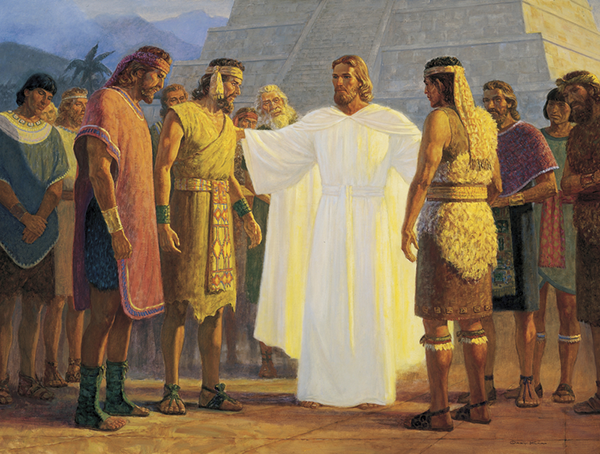Priesthood power and influence are maintained using Christlike attributes
In the premortal existence, the adversary desired to use coercive methods to forcibly save all Heavenly Father's children. Likely, he was neither recognizing nor understanding how we spirit children needed to grow and what environment would be most conducive to that growth. Where Satan wants to dictate and demand, the Savior desires to invite and patiently wait for us to learn. Where Lucifer wants to use guilt and fear, the Savior employs tender promises and healing love.
The powers of the priesthood are maintained strictly by using the methods and attributes that are like Christ. Therefore, priesthood power and influence cannot be exerted by any other means. Consider the following clarification found in the Doctrine and Covenants:
"No power or influence can or ought to be maintained by virtue of the priesthood, only by persuasion, by long-suffering, by gentleness and meekness, and by love unfeigned;
By kindness, and pure knowledge, which shall greatly enlarge the soul without hypocrisy, and without guile"
DC 121:41-42
By kindness, and pure knowledge, which shall greatly enlarge the soul without hypocrisy, and without guile"
DC 121:41-42
"There is not a man holding any position of authority in the Church who can perform his duty as he should in any other spirit than in the spirit of fatherhood and brotherhood toward those over whom he presides. Those who have authority should not be rulers, nor dictators; they should not be arbitrary; they should gain the hearts, the confidence and love of those over whom they preside, by kindness and love unfeigned, by gentleness of spirit, by persuasion, by an example that is above reproach and above the reach of unjust criticism. In this way, in the kindness of their hearts, in their love for their people, they lead them in the path of righteousness, and teach them the way of salvation, by saying to them, both by precept and example: Follow me, as I follow our head."
President Joseph F. Smith
President Joseph F. Smith
This important doctrine of the priesthood is more than something we should 'do'. These are attributes that every priesthood holder should weave into their very being. President Joseph F. Smith further explains:
"Christlike attributes must be cultivated. The priesthood holder uses ‘pure knowledge that will greatly enlarge the soul’ in influencing others. This means that he uses gospel knowledge, not rhetorical techniques or tricks, in persuading others. He does not resort to duplicity, shading of truth, wiliness, craftiness, cleverness, or deceit. He is always honest."
President Joseph F. Smith
President Joseph F. Smith
Abandoning all use of coercive methods of influence, such as fear, guilt, and force is necessary to influence others to come unto Christ. There is no priesthood power found among these approaches. This is true not only in our leadership in church positions but also with all whom we come in contact. Therefore, it cannot be a series of attributes that we 'turn on' and 'turn off' as the situation dictates. Nor are they characteristics to be used only on the outward shell while feeling differently inwardly. Rather, the attributes of love, long-suffering, meekness, gentleness, kindness, and godliness must become part of who we truly are on the inside. While pride, ego and all the attributes of the natural man would lead us away from these characteristics, these are qualities that can and should be cultivated within ourselves. At the end of our life, if Heavenly Father discovers that we have exerted all our effort to develop these feelings, even though we may not have perfectly achieved them, it will be well with us.

In summary, the purpose of the priesthood is to help others increase their discipleship of Christ. This is done by loving invitation, gentle encouragement, humble instruction, and long-suffering patience. It is never by dictation nor by force. To have priesthood power and legitimately influence Heavenly Father's children, we must do so with love while attempting to apply the characteristics that are inherent in the divine nature of our Heavenly Father and his son, Jesus Christ.
Points to Ponder

- Consider your own patterns with others. In what ways do you use coercive methods to influence others? How can you recognize when you are using such a pattern and change your method to something more like the Savior?
- Ask a loved one to tenderly give you guidance on how you can improve one attribute related to how you influence others to something that is more consistent with nature of the Savior.
- Avoid creating a long list of attributes you need to change. Ask Heavenly Father to guide you to the opportunity for change that is most important for you right now.
 Want More?
Want More?The principles we are studying together come from the book, 'The Melchizedek Priesthood' by Elder Dale G. Renlund and Ruth Lybbert Renlund. Although there are many books on various subjects, including the priesthood, when an apostle of the Lord and his wife provide such instruction, we feel it important to take notice. While we have attempted to consolidate principles related to the doctrine of the priesthood found in the book, we recommend every individual read this work for themselves to gain even more understanding. As we study personal attributes described herein, we seek not only to learn the doctrine, but also to assimilate these attributes into our character. As we do this, we may discover where we fall short, but such recognition provides focus and helps us to become a better, more deliberate disciple of Jesus Christ.
President Jason Ward
President Dennis Stanley
President Rodney South
President Dennis Stanley
President Rodney South
Ezra Taft Benson